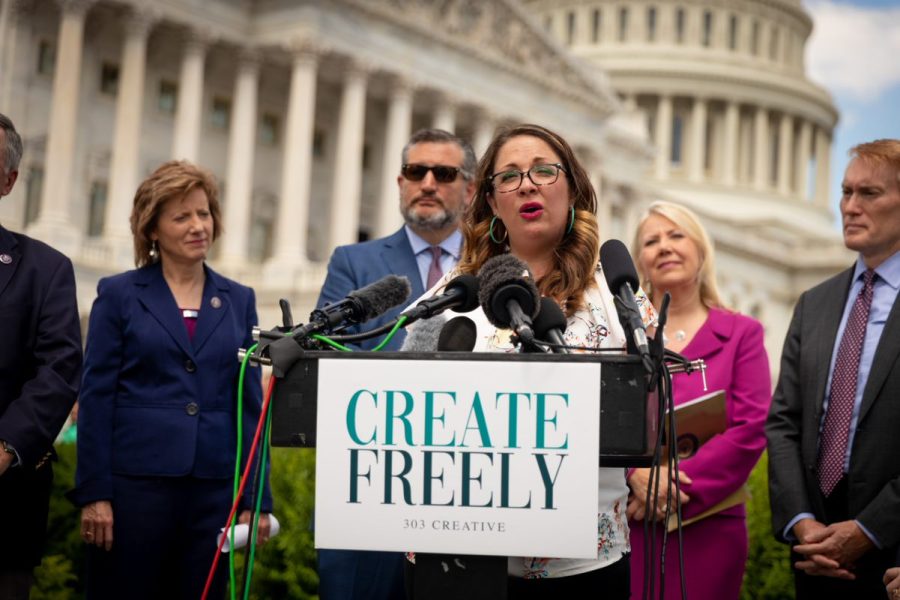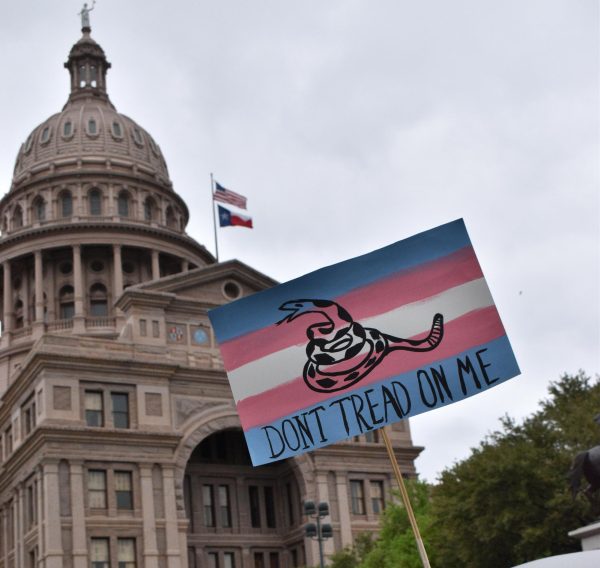Supreme Court’s conservative majority complicates new case concerning gay rights, students argue
In this photo provided by Alliance Defending Freedom, Lorie Smith speaks at a Washington, D.C. news conference earlier this year.
In 2018, Masterpiece Cakeshop v. Colorado Civil Rights Commission was unveiled before the Supreme Court (SCOTUS), where a Christian baker argued the first amendment protected his right to turn away a gay couple seeking a wedding cake. The case ultimately ended in favor of the baker, however, in 2022, history appears to repeat itself.
Now, SCOTUS has begun hearing the case of Lorie Smith, a Christian web designer who claims the first amendment allows her to refuse service toward gay couples to design a wedding website. To do this, she wishes to publish a statement on her own website informing possible customers of her refusal of services toward LGBTQ+. However, Colorado’s anti-discrimination law prevents such a statement from being made. Therefore, Smith argues the law violates her first amendment rights and seeks to overturn it completely.
“I disagree with [Smith’s] argument as a whole because gay rights fall under civil rights which are guaranteed to minorities that require government action,” a queer senior Westlake student said who requested to remain anonymous due to their family’s religious beliefs. “The first amendment protects symbolic speech, but not hate speech.”
Regardless, with a SCOTUS 6-3 conservative majority that critics have argued have bias against LGBTQ+ peoples, many worry how ruling in favor of the web designer will encourage more discrimination against these minorities.
“It makes me worry about the security of gay rights in the U.S. since a lot of anti-gay and anti-trans legislation have been passing in southern states,” the senior said. “Furthermore, they’re considering reviewing Obergefell v. Hodges when the Supreme Court has an overwhelming conservative majority.”
Obergefell v. Hodges guaranteed same-sex couples the right to marry. Many LGBTQ+ people worry that this conservative majority would seek to take away previously established gay rights which took activists decades to achieve.
“They would most certainly try to leave gay marriage to the size region of states if possible,” the senior said. “I doubt they would protect it on a federal level.”
Others disagree with the level of protection SCOTUS will offer toward precedents.
“The current supreme court would defend gay rights depending on which right and to what extent,” junior Gustavo Hochman said. “But they wouldn’t necessarily do anything to increase gay rights.”
However, he still agrees that the conservative majority holds a bias against same-sex couples.
“There’s an age factor because they grew up in a different time,” Hochman said. “And I think that may impede their ability in some cases, like those dealing with gay rights, to make the right decision.”
Because SCOTUS is expected to rule in favor of the web designer, more cases regarding LGBTQ+ people could be brought before courts and ultimately increase discrimination.
“This makes me worry about other cases passed under the same premise of privacy clause,” the senior said. “If one is questioned, many others are subject to questioning as well.”











